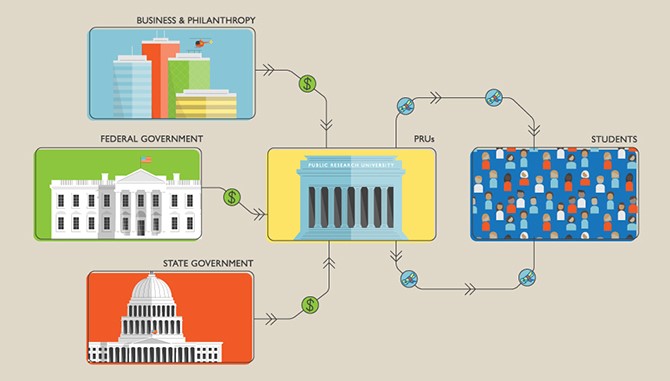Lincoln Project Additional Recommendations

As the financial model of public research universities changes, driven primarily by diminishing contributions from the states, these institutions must find ways to respond to their pressing financial needs while also building for the future.
Public research universities cannot solve these challenges without help. They need new partners.
State and federal governments, business, and the philanthropic community all have roles in forging the new compact needed to sustain and strengthen public research universities. Each of these recommendations—many of which have already been implemented by public research institutions—applied in combination will play a key role in preserving these essential institutions.
Recommendations for Public Research Universities
- Establish annual cost and efficiency targets, and publish progress reports for the university community and the broader public.
- Form alliances with other colleges and universities (public or private, state or regional) to facilitate research partnerships, shared course offerings, collective purchasing contracts, common facility usage, and collaborations on innovative programs.
- Explore and pursue new revenue streams, consistent with the fundamental values of public research universities.
- Enhance advancement and development activities within the institution, emphasizing unrestricted giving in support of core educational goals.
- Pursue multi-partner capacity-building matching programs. For example, state and federal agencies working together with philanthropic partners could provide transformational support for university faculty.
- Signal to the business community that universities are willing partners by accelerating and simplifying the transfer of knowledge to the private sector.
- Encourage governing boards to pursue the expertise needed to adjust to new funding models.
- Provide comprehensive financial aid to low-income in-state undergraduate students.
- Track student performance in real time and intervene appropriately to improve student success.
- Improve transfer pathways from community colleges and via online interactive gateway courses.
Recommendations for State Government
- Find alternative strategies to balance the state budget besides cutting university funding. Higher education cannot continue to be the “balance wheel” for state budgets without compromising either the public character of public research universities or their educational missions.
- Reverse cuts made over the last decade, restoring funding to pre-recession levels, incrementally if not in their entirety at once.
- Establish long-term funding goals, including targets for the growth of state investment, to stabilize support and assist universities in long-term planning.
- Create state incentives for corporations to support scholarships at public research universities–either at individual institutions or at multiple institutions–since corporations draw heavily upon the talent pool and research generated by these institutions.
- Provide comprehensive financial aid to low-income in-state undergraduate students.
- Encourage improvements in transfer pathways from community colleges.
- Reduce unfunded regulatory mandates.
Recommendations for the Federal Government
- Recognize that the intellectual infrastructure of the nation is as important to the future as the physical infrastructure.
- Incentivize corporate and philanthropic contributions to public higher education through matching programs and tax breaks.
- Through challenge programs, encourage partnerships among state governments, federal agencies, private philanthropists, and public research universities (such as a three-way partnership to provide 10,000 endowed faculty chairs over ten years.)
- Consider a new national endowment for public higher education, including public research universities.
- Simplify the Free Application for Federal Student Aid (FAFSA).
- Review and reduce unfunded federal regulatory mandates.
Recommendations for the Private Sector
- Acknowledge the importance of public research universities to the preparation of the American workforce by supporting public research university scholarships and internships.
- Promote partnerships among private foundations, similar to the Science Philanthropy Alliance, to combine resources and support student access to research universities.
- Cooperate with universities to develop licensing policies that accelerate the transfer of knowledge and research from campuses to the public.
- Engage in public advocacy in each state on behalf of public universities and in support of the nation’s intellectual infrastructure.
Download the full report Public Research Universities: Recommitting to Lincoln’s Vision—An Educational Compact for the 21st Century.
Additional Findings: